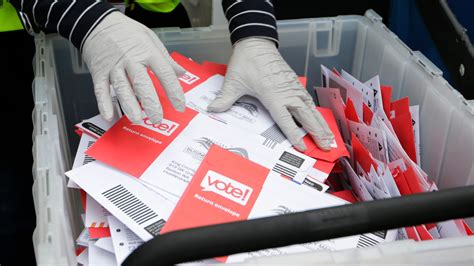Reviewing the results of the sudden, sweeping expansion of mail-in voting across the nation in the 2020 election, the America First Policy Institute warns that mass mail-in voting is fraught with risks of fraud and other election irregularities and urges the adoption of rules to make absentee voting secure.
Originally, mail-in ballots were reserved for “military members away from home and other individuals who were legitimately unable to vote in person on Election Day because of disability or travel,” the populist conservative think tank recounts in an August study, “The Case Against Mass-Mail In Ballots.
However, since 2000, when Oregon became the first state to start using no-excuse absentee ballots, 29 other states and Washington, D.C. also adopted the practice.
“More states adopted these measures during the 2020 Election Cycle, and now only Texas, Louisiana, Mississippi, Tennessee, and Indiana require an excuse to request a mail-in ballot,” according to the AFPI.
“Shockingly,” the report adds, “there is now a widespread effort to make no-excuse absentee ballot measures permanent across all elections.”
Typically, absentee ballot rules require voters to request ballots and provide identification before they are sent out, AFPI explained. Then, after the clerk’s office verifies a voter’s identity, the voter will receive a ballot that can either be mailed in or returned in person at a designated polling location.
But with universal mail-in voting, all registered voters are sent absentee ballots regardless of whether they requested them.
Eight states — California, Colorado, Hawaii, Nevada, Oregon, Utah, Vermont, and Washington — have made universal mail-in voting permanent.
When mass mail-in voting was implemented in many states during the COVID-19 pandemic last year, drop boxes were installed for voters to drop off their mail-in ballots, “oftentimes with no security or chain of custody to show their security,” the report said.
“This removed any obstacles from ballots being illegally trafficked,” the study found, linking to a Vision Times story on the lack of “chain of custody documents for thousands of mail absentee ballots deposited in drop boxes and transferred to counting locations” in Georgia.
At times, “the security of these ballots was so negligent that ballot drop boxes were sometimes vandalized and torched,” the report said, citing an NBC 10 Boston news article on a ballot drop box being set on fire.
The 2020 election also provoked widespread complaints that the distribution of drop boxes was politically biased and unequal.
“In Democrat Delaware County, Pennsylvania, one drop box was placed every four square miles and for every 4,000 voters,” reported The Amistad Project. In contrast, the election integrity watchdog found, “In the 59 counties carried by Trump in 2016, there was one drop box for every 1,100 square miles and every 72,000 voters.”
Compounding the weaknesses of mass mail-in voting is the problem of inaccurate and outdated voter rolls, which, according to the AFPI, led in at least one situation to thousands of people receiving ballots from two states, as well as to some instances in which votes were cast in deceased people’s names.
Read More From The PatriotAmerican
Citing the need for standards “to instill greater security in the process” of mail-in voting, the AFPI report offers a series of recommendations, including:
- procedures that would guarantee “legal ballots are secured and counted quickly,” ensuring only legal ballots are cast, and matching mailed ballots “to their envelopes after being opened to secure future authentication procedures and audits.”
- the adoption of ballot-tracking applications so ballots don’t get lost in the mail, and allowing ballot applications to be sent only via First Class mail, “which allows state elections officials to use their Address Correction Services to match registrations with more updated address lists, thus providing additional security measures in ensuring only legally registered voters receive a ballot.”
- sending mail-in ballots only to voters who request them and have their identities verified.

